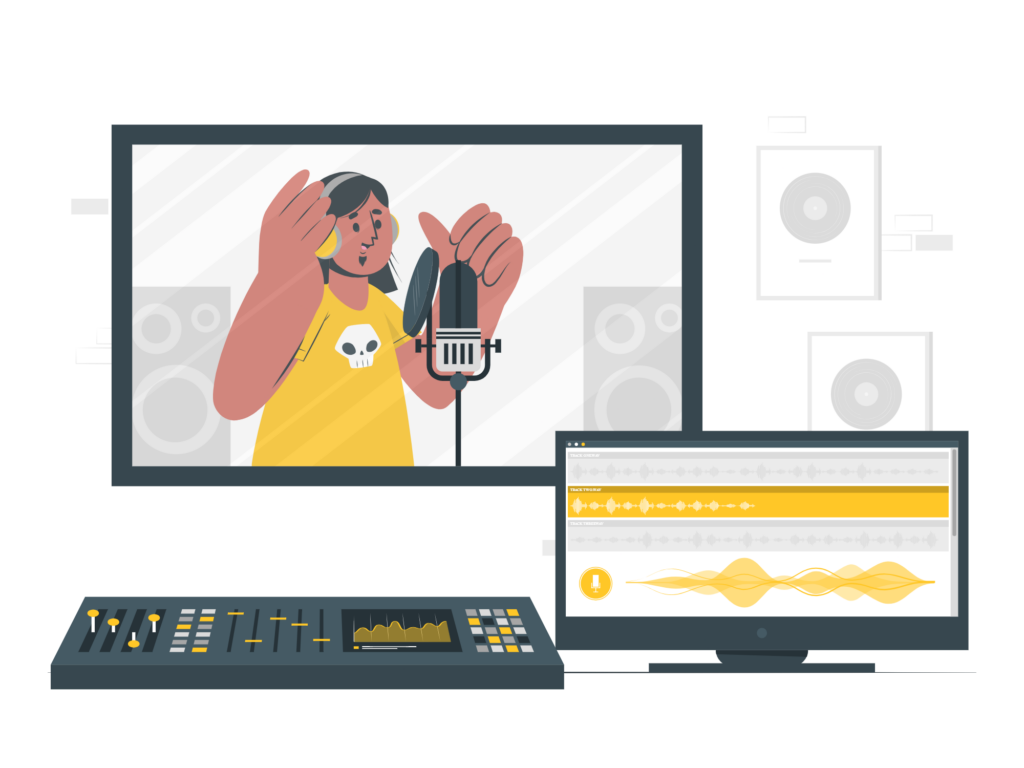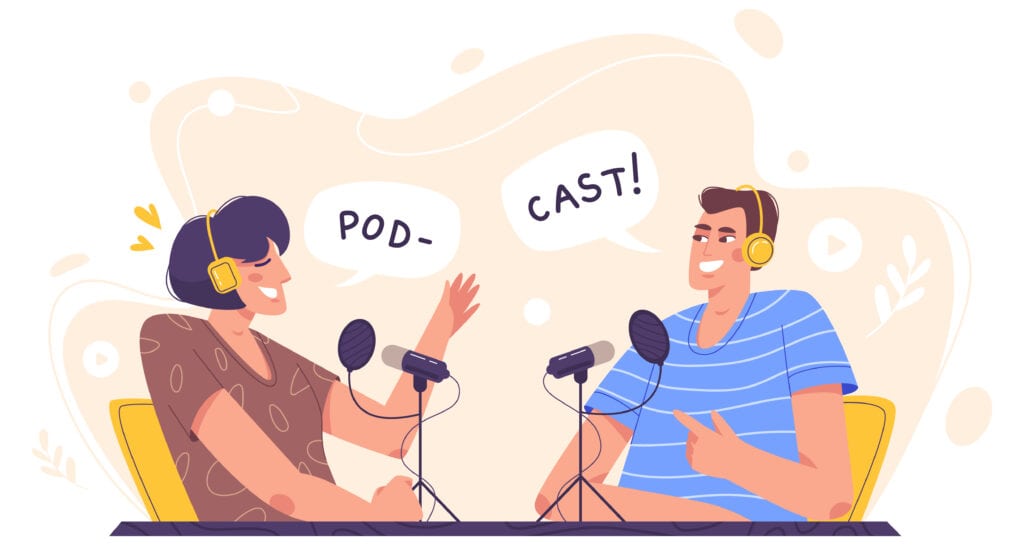
Download Your Free
Ultimate Podcast
Launch Checklist
Picture the scene: you’ve got a voice and a vision, and it’s time to let the world in on your conversations. That’s where mastering how to start a podcasting business comes into play. It’s not just about chatting into a mic; it’s crafting stories that captivate, educate, and inspire.
This journey of yours? It means setting up shop with solid foundations—a plan as concrete as the resolve in your voice. You’ll get savvy with legal structures, smart about money matters, and choosy when picking out mics that make you sound like a pro.
You’re going to dive deep into creating content that resonates so loudly listeners can’t help but tune in. And don’t forget building an online presence—your digital stage—and promoting across channels until those download numbers soar. All this before even thinking about turning those plays into paychecks.
Ready for all this goodness? Buckle up because we’re taking off!
Table of Contents:
- Crafting Your Podcast Business Plan
- Setting Up Your Podcasting Platform
- Setting Up Your Podcasting Platform
- Assembling Your Recording Studio
- Developing Engaging Content for Your Audience
- Building an Online Presence for Your Podcast
- Promoting Your Podcast Effectively
- Monetizing Strategies for Your Podcast Venture
- Analyzing Performance Enhancing Growth
- Conclusion
Crafting Your Podcast Business Plan
Starting a podcasting business feels like planting a MoneyTreeSeed. It’s about nurturing it with strategy, patience, and the right moves at the right time. A well-crafted business plan is your watering can here; let’s get that tree to sprout.
Defining Your Podcast’s Mission and Vision
Your podcast should echo your passion while also aiming for those earbuds far and wide. Think long term: what do you want people to think when they hear your name? Maybe you’re looking to be the go-to source for riveting true crime tales or maybe the voice that unravels tech trends in bitesize episodes?
A solid mission aligns with your core purpose—why this podcast exists beyond making money—and vision sets where you see yourself years down the line in Apple podcasts or Google podcasts alike.
Structuring Your Business Legally
You wouldn’t build a house without laying down some ground rules first, would you? The same goes for starting any legit enterprise—even one as cool as running a podcast. Choosing between an LLC or sole proprietorship isn’t just legal mumbo-jumbo; it shapes how much of your personal assets are on the line if things go south.
Making sure everything is by-the-book means fewer headaches later on when revenue starts rolling in from ad sponsorships or affiliate marketing deals because let me tell ya’, Uncle Sam will want his share.
Financial Planning for Your Podcast
We’re talking numbers now—scary but crucial. How much does all that fancy microphone equipment cost anyway? Or better yet, what’ll it take until my hobby turns profit corner?
- Dive into startup costs (spoiler alert: quality doesn’t come cheap).
- Tackle operating expenses head-on because web hosting services don’t pay themselves.
- Last up, forecast potential earnings so there’s more than hope fueling this venture.
Setting Up Your Podcasting Platform
Selecting Microphones Within Your Budget:
Remember when I mentioned microphones aren’t cheap? They can range quite wildly, but fear not. There are plenty out there designed not to break banks. Adobe Audition makes editing less of a chore too. The key here is balance – finding tools good enough to give you the quality you need without emptying your wallet. Do some digging and read reviews; this way, you’ll land on something that hits that sweet spot between cost and performance.
Setting Up Your Podcasting Platform
Picking the right podcast hosting service is like finding a new home for your digital audio files. It’s where your content lives, breathes, and gets picked up by listeners all over the world through various podcast directories.
Choosing a Hosting Service That Fits Your Needs
You want to look for a hosting platform that can grow with you but doesn’t break the bank when you’re just starting out. There are plenty of free options if money is tight, yet they might not give you enough room as your audience expands. Think about it – what good is saving some cash now if it means stifling your show’s potential later?
A robust RSS feed from your chosen host lets Apple Podcasts and Google Podcasts gobble up every new episode so people can listen wherever they please. But remember, even though these popular podcast directories get lots of traffic, don’t forget smaller players in the game; make sure everyone has access to tune in.
When looking at costs versus benefits of different services, consider this: You wouldn’t skimp on comfy shoes before running a marathon; why would you cut corners on something as crucial as where your episodes live? With that said naming your podcast cleverly could be more important than splurging on high-end features upfront.
Your choice also needs to jive with how often you plan to release episodes—daily shows have different demands than weekly ones—and whether or not having direct support from real humans (instead of troubleshooting forums) makes you feel comfortable during crunch times or technical hiccups.
To wrap things up neatly: think long term when choosing where to house those precious audio files because picking wisely now will save headaches down the road when thousands hang onto every word dropping from their speakers.
Assembling Your Recording Studio
The quest to create a podcast that captivates starts with setting up your very own recording studio. This is where you transform ideas into audio magic for listeners worldwide.

Selecting Microphones Within Your Budget
A good microphone is like the paintbrush of an artist—it’s essential. The market offers a wide range, from modestly priced mics under $20 to those boasting professional-grade quality at around $10,000. But fear not; there’s no need to break the bank right away. You can begin your journey with affordable options and still produce clear, crisp sound—after all, even Adobe Audition started somewhere before becoming a go-to editing software alongside free tools like GarageBand and Audacity.
To navigate this sea of choices, think about what suits your voice and format best. Whether it’s an intimate interview or energetic storytelling—a dynamic or condenser mic might be just what you need.
Finding the Right Editing Software
Your raw recordings are diamonds in the rough—they shine brightest after some polishing through editing software. With both paid and free options available, programs such as GarageBand offer user-friendly interfaces perfect for beginners while Audacity caters to those who love diving deep into detailed audio manipulation without spending a dime.
Picking out software isn’t just about features though; consider how much time you’re willing to invest in learning new tricks of the trade as well as compatibility with other equipment you use—or plan on using—as part of your growing podcast empire.
Rounding Out Your Equipment List
Beyond microphones and editing platforms lies additional gear needed for that professional feel—think headphones for monitoring levels during recording sessions or pop filters that keep pesky plosives at bay (you know—the annoying “pop” sounds when pronouncing words starting with ‘P’). And let’s not forget cables. Ensure they’re long enough because nothing ruins flow quite like being tethered too closely together around one table trying desperately not knock everything over mid-episode.
Developing Engaging Content for Your Audience
Identifying Topics That Resonate with Listeners
You know that feeling when you hit play on a podcast episode and it feels like the host is speaking directly to you? That’s no accident. Great podcasts nail this by understanding their ideal listener down to the core. They don’t just create content; they craft experiences tailored to what their audience craves.
To find those golden topics, smart podcasters become detectives of sorts. They scour through social media channels, listen intently to feedback, and keep an eye on popular trends within their niche. This isn’t about guessing games—it’s strategic research aimed at generating relevant ideas that make people feel heard and understood.
The most successful podcasts are not just heard; they’re felt. Think about your favorite show—chances are it strikes a chord because it speaks your language or explores issues close to your heart. By tapping into this emotional connection, creating content becomes less of broadcasting information and more about starting meaningful conversations.
Leveraging Social Media Platforms
Social media accounts aren’t just digital real estate—they’re bustling markets where interactions turn listeners into loyal fans. But let’s get one thing straight: blasting links across every platform won’t cut it anymore.
We live in an age where folks scroll faster than lightning unless something makes them stop dead in their tracks—a witty tweet here, a behind-the-scenes story there—these moments build trust over time as potential listeners begin seeing value beyond each length episode.
Email marketing can be another secret weapon in your arsenal if done right (because nobody likes spam). Imagine dropping valuable nuggets from upcoming episodes right into someone’s inbox. Now that’s how you turn casual scrollers into engaged subscribers who look forward to hearing from you week after week.
With these insights under your belt courtesy of MoneyTreeSeed.com—you’re ready not only to start a podcast but also leave indelible marks on hearts and minds alike.
Emails packed with value from your episodes can transform casual browsers into eager subscribers ready to tune in regularly.
Building an Online Presence for Your Podcast
Your podcast is like a seed; it needs the right environment to grow. An online presence does just that, offering fertile ground where your brand can flourish and reach eager ears worldwide.

Leveraging Social Media Platforms
To plant your podcast firmly in listeners’ minds, you need to be where they hang out: social media channels. But this isn’t about spraying posts like a hose and hoping something grows. It’s about cultivating connections with precision—think of each tweet or post as watering the soil around your MoneyTreeSeed.com venture carefully.
A savvy podcaster uses their social media accounts not just for broadcasting messages but also for listening—to feedback, conversations, and trends that could shape future episodes. The trick? Be as responsive on Twitter or Instagram as you would be if someone complimented your show at a coffee shop—it builds trust faster than caffeine kicks in.
Email marketing may seem old school next to TikTok dances and Snapchat filters, but it’s still one of the most effective tools in nurturing relationships with listeners who’ve given you permission to enter their inbox—treat these contacts like VIPs at an exclusive club.
The Art and Science of Naming Your Podcast offers fantastic insights into making those first impressions count when people start exploring new shows.
So what’s the takeaway here? Don’t just shout into the digital void; engage meaningfully across multiple platforms because that’s how roots spread wide—and before you know it, from Apple Podcasts’ charts to Google Podcasts’ recommendations—you’ll see green shoots popping up everywhere.
Promoting Your Podcast Effectively
Imagine the sound of your podcast breaking through the static, reaching ears across the globe. To get there, you’ve got to market like a maestro. So let’s tune into some promotional strategies that’ll turn up your listener count.
Launch Campaigns Across Multiple Channels
Gone are the days when simply uploading an episode was enough. You need to create buzz around new episodes with coordinated promotional efforts that make waves on multiple platforms. Think about it: people listen while scrolling through social media, browsing search engines or watching video production reels for inspiration. These channels are where you catch their attention and invite them in.
To start podcast marketing right, design cover art that pops and screams ‘listen to me.’ This visual hook can work wonders when shared across media accounts – think Facebook posts decked out with your snazzy artwork or Instagram stories teasing your latest episode.
Your next move? Submit podcast feeds far and wide. Get cozy with Apple Podcasts and Google Podcasts because they’re like the cool kids at school; everyone wants to hang out with them. But don’t stop there—tap into popular podcast directories where niche audiences may lurk, eager for content just like yours.
Create Engaging Launch Content
You’ve slaved over every audio file; now it’s time for showmanship. Whip up intriguing descriptions packed full of SEO keywords but still ooze personality — this is what will persuade those hovering over play buttons worldwide.
A smart release strategy also means having multiple episodes ready before hitting publish so listeners can binge away happily (and hey, who doesn’t love a good binge?). Plus this gives off a professional feel from day one which helps build trust long term—a key ingredient if you want folks sticking around season after season.
No matter how great your content is though remember: promoting takes time but stick with it because once momentum builds… well let’s just say things might get loud in all the right ways.
Monetizing Strategies for Your Podcast Venture
Talking money is always exciting, especially when it comes to turning your podcast passion into profit. Think of your show as a tree that can bear various fruits – advertising sponsorships, affiliate marketing, Patreon contributions, and merchandise sales.
Advertising Sponsorships: The Golden Apples
Sponsorship deals are the ripest fruit on many podcasters’ trees. But they don’t just fall into your lap; you need to shake things up. Start by crafting compelling pitches for potential sponsors. Show them why their brand aligns with your content and how sponsoring can give them access to an engaged audience. And remember, negotiation is key—be clear about what you’re offering but also be ready to listen and adapt.
To snag those sweet deals, crafting a unique selling proposition (USP) is crucial because it tells sponsors exactly why they should pick you over others.
Affiliate Marketing: Low-Hanging Fruit
Affiliate marketing lets listeners help support the show simply by purchasing products or services through links you provide—a win-win situation where everyone gets something out of the deal. Plus, these arrangements often require less commitment than direct sponsorships but still contribute nicely toward covering costs.
Patreon: Nurturing Loyal Seedlings
If community support sounds like music to your ears, Patreon can harmonize beautifully with that tune. It’s like inviting listeners into a special club where they get exclusive perks in exchange for supporting each episode financially—an excellent strategy if consistent engagement feels more comfortable than one-off ad spots or affiliations.
Making Merchandise Work For You: Harvest Time.
Your voice isn’t the only thing worth sharing; custom-designed merchandise allows fans to wear their love for your podcast on their sleeve—or coffee mug. From t-shirts sporting catchy phrases from episodes to stickers with cool cover art designs—these tangible goods not only serve as walking advertisements but also create another revenue stream while letting fans flaunt their favorite podcasts everywhere they go.
Remember this—it takes time before monetization efforts start bearing fruit. The Art and Science of Naming Your Podcast suggests choosing a memorable name might draw more attention (and advertisers) right from the start. So let’s make sure people aren’t just listening—they’re buying into what makes your show truly unique.
Analyzing Performance Enhancing Growth
Cracking the code of podcast growth requires a keen eye on performance metrics. Imagine you’re steering a ship through the choppy waters of content creation; your analytics tools are your compass, guiding you to more listeners and greater engagement.

Engaging Your Audience with Measurable Insights
Diving into analytics isn’t just about numbers—it’s about understanding people. Who tunes in when you release episodes? What topics make them hit ‘subscribe’? You can consult experts or rely on platforms like Apple Podcasts and Google Podcasts that offer detailed insights into listener behavior. This data helps tailor your content to what really resonates, potentially transforming casual listeners into die-hard fans.
Beyond who listens is how they listen. Are they sticking around for the full length episode or dropping off after the intro music fades out? These patterns reveal much about audience preferences, enabling tweaks that keep ears glued till outro music plays.
Growing Listenership Through Strategic Content Distribution
To cast a wider net, consider submitting podcasts to popular directories and ensuring RSS feeds are up-to-date—think of it as planting seeds across various digital gardens where potential fans might stumble upon your show while scrolling their preferred platform.
Your efforts should extend beyond audio files alone. Social media channels act as amplifiers for each episode released—a well-timed tweet or engaging Instagram story can funnel traffic back to both new and existing podcast content.
Scaling Operations by Learning From Metrics
Sometimes growth means stepping back from the mic and looking at cold hard stats provided by hosting services like Adobe Audition’s podcast editing features or analyzing download trends via free options available online.
The key lies in not just collecting these stats but interpreting them correctly because even royalty-free music won’t save an episode no one wants to hear twice. Remember: every stat tells a story—the trick is learning how to read it right so that next time someone asks “How do I start my own business podcast?” you’ve got some tried-and-tested wisdom up your sleeve.
Discovering unique selling propositions (USPs), aligning those with measurable objectives such as scaling operations based on solid evidence rather than gut feelings—that’s where real growth begins.
Conclusion
Starting your podcasting business is an adventure. You’ve laid the groundwork with a rock-solid plan, navigated legal labyrinths, and crunched numbers for financial success.
You picked out perfect mics and mixed content that matters. Your voice found its digital stage across social media, calling in crowds to listen up.
Promotions pushed your message far and wide; now every download dials up dreams of dollars. It’s more than audio—it’s your art on airwaves.
To wrap it all? Know this: Crafting stories takes time but builds trust like nothing else. Keep honing those episodes—because when people start talking about how to start a podcasting business, they’ll be talking about you.

Download Your Free
Ultimate Podcast
Launch Checklist




